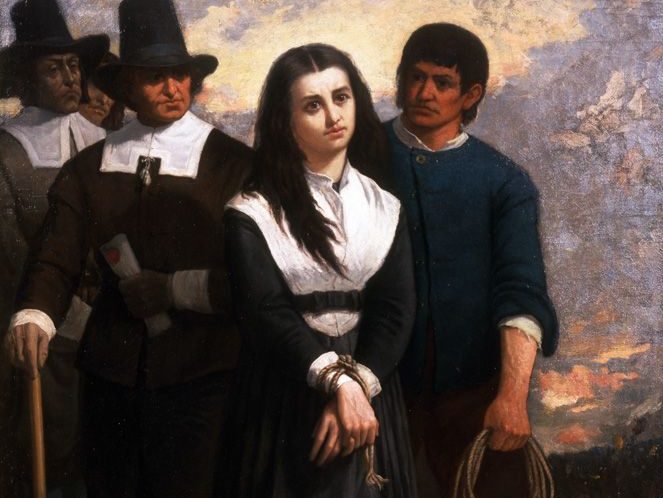When I first started what became my novel The Witches of Bellinas, there were no witches, no witchcraft at all. I had wanted to write about a beautiful village that seemed perfect but had hidden secrets after spending a summer in a beautiful, remote area near San Francisco that I later learned had a reputation for attracting cults, among other rumored strangeness. At some point while drafting, magic became the bridge in the narrative between the awe-inspiring beauty of the landscape and the secret, ugly acts committed by people.
Being a woman alone in an eerie place made me wonder not only why women would turn to magic, but why wouldn’t they? What happens when people claim the mantle of witch, and what happens when there are different ideas of what that means? What makes a witch? What is magic and what is simply (or rather, intricately, mind-bogglingly complexly) nature at work? These are all questions I wanted to explore in The Witches of Bellinas.
There’s that slogan you see on bumper stickers and T-shirts sometimes: “We’re the granddaughters of witches they didn’t burn.” As others have pointed out, that line sort of misses the point: Most people accused of witchcraft, across all genders, were not practicing witchcraft. They had slighted neighbor; they owned some land or livestock someone wanted; they had cured a patient the village doctor failed to. The books on this list are not just about being a witch—they’re about people who have been accused of being witches—and what that happens afterward. Who is considered a witch, and why, reveals more about those accusing than the accused, and these are books I turned to when trying to construct a community that might conspire to use magic, but that could also turn its use into a crime.
The Manningtree Witches by A.K. Blakemore
This novel perfectly illustrates what a woman living alone risks when she has agency, means, and a mind to follow her own path: In 17th-century Manningtree, an English town where men are scarce following a war, a strange man dressed in black arrives calling himself the Witchfinder General. Soon, witch trials are underway, and Rebecca West, the narrator, must navigate suspicion, accusations, and worse.
Everyone Knows Your Mother Is a Witch by Rivka Galchen
A mother offers her testimony after a neighbor accuses her of trying to enchant her with a potion in Germany in 1618. What is Katharina Kepler’s real crime? Is it the success of her children, especially that of her eldest son, Johannes Kepler, the famed mathematician? A gorgeous contemplation of science and superstition, and a stark reminder that it’s not only men who serve the patriarchy.
Witches by Brenda Lozano
This multi-perspective novel unfolds in narratives from Zoe, a journalist investigating the murder of a curandera—aka a healer, or a witch—named Paloma in a small town in Mexico, and Feliciana, Paloma’s cousin. Paloma was a Muxe, born a boy and living as a woman. The safety of anyone living outside of the patriarchy’s norms is ultimately at the whim of whoever’s in charge.
Circe by Madeline Miller
Told from the perspective of one of literature’s oldest and most famous witches, Circe narrates her life story as an immortal sorceress: From growing up in the house of her father, the sun god and Titan, to life as an exile on the island where she’s been confined. A celebration of the magic in nature and in life as a solitary woman, we also get cameos by heavy-hitters from Greek mythology, including Circe’s setting the record straight on what happened when Odysseus invaded her island and why his men deserved to be transformed into pigs.
Hurricane Season by Fernanda Melchor, translated by Sophie Hughes
Dreamy, terrifying, and engrossing, Melchor, a former journalist, tells the story of a small, impoverished town in Mexico where The Witch has been murdered. Born a man, she was known for providing abortions to those in need. A brutal read that’s often compared to Roberto Bolaño’s 2666 for the depiction of violence and drugs, The Witch is a victim of a system that uses up everyone in town in different, tragic ways.
Witches of America by Alex Mar
This is a memoir-history-anthropology hybrid that chronicles the author’s encounters, and participation in, with various covens and with witches across the United States. She pairs this first-person spiritual search with the history of witchcraft and what it means to be a witch and to practice witchcraft in the modern world.
I, Tituba: Black Witch of Salem by Maryse Condé, translated by Richard Philcox
The witch novel of all witch novels. Condé has taken the life of a real woman, accused of witchcraft during the Salem witch trials, and rendered her into a compassionate, fierce, magical woman who yearns for love and is in turn only returned hardship. Tituba narrates her life in beloved Barbados, how following the wrong man led her to become enslaved by Samuel Parris and taken to the Salem colony, and what she must do to return to her homeland.









